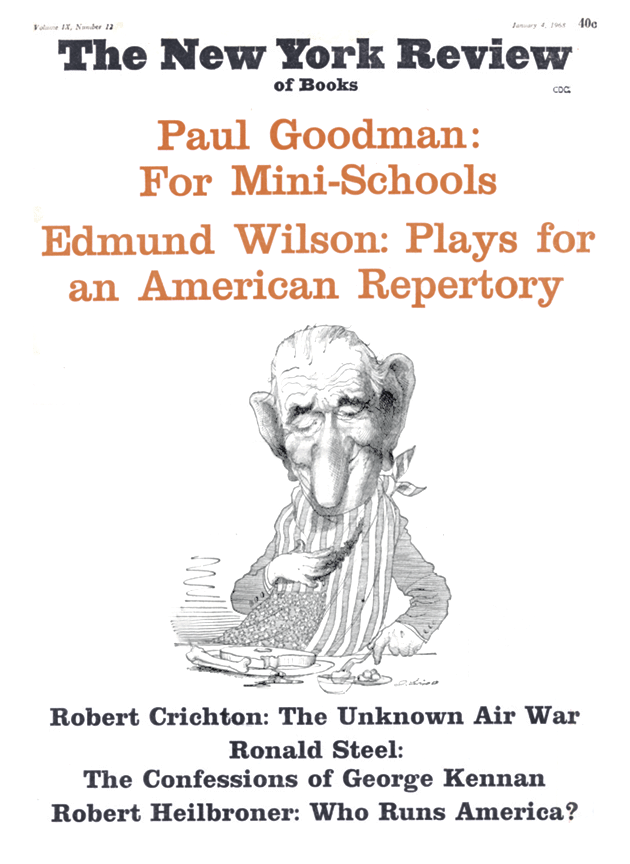In response to:
The Survivor from the November 9, 1967 issue
To the Editors:
I cannot expect to be granted sufficient space, although I think the matter grave enough, to repudiate in entirely A. J. P. Taylor’s apologetics on behalf of Ilya Ehrenburg [NYR, Nov. 9, 1967]…
Mr. Taylor says “Ehrenburg’s record was in fact by no means dishonorable…he kept his standards intact.” To what record and what honor does he refer? Carrying the Communist peace message abroad in a futile attempt to assuage his guilt concerning his actions and complicities in domestic atrocities? But Mr. Taylor is perplexed that “Ehrenburg felt he ought to be ashamed of himself” (and I am astounded that Mr. Taylor is perplexed). Shame isn’t a very useful feeling; and in any case, it can be related to imaginary behavior. But when a man has just cause for remorse, however unself-consciously expressed this may be—perhaps only in a sense of shame—I do not think it advisable to separate him from his atonement.
I should like to know how Mr. Taylor proposes to distinguish between the inconvenient integrity of Isaac Babel who gave up his life for his honor (I see that Mr. Taylor is not averse to using such old-fashioned words, but what about their meanings?) and someone like Ehrenburg who not only acted from motives precisely related to opportunism (and his bland centrist type is indispensable to his sort—and now, increasingly, our sort—of regime), but who twice brought his dear friend, Babel, back from the dead and two times tolerated—no, assisted at—his remurder? Surely even a defective sense of justice may not regard repeated murder with impunity. Short of total moral depravity, a sense of shame would be little enough to acquire in such a process.
Although there are examples galore, may I consider just this defection from human virtue in Ehrenburg’s relations with Babel, with Babel’s family and with his work? Although Ehrenburg knew Babel had died in 1941, he was ordered to Paris in 1944 to inform Babel’s wife, hoping still for her husband’s return there, that he was alive and well, but (in order to explain the failure of communication) under house arrest. It was not until 1956 that Ehrenburg was permitted to tell Mrs. Babel that her husband had died in a Siberian camp fourteen years before; whereupon she, not surprisingly, died.
Ehrenburg, poor old scamp, feeling rather contrite about it all and much else besides (although Mr. Taylor assures us he need not have) “edited”—what perfidies are committed under the guise of official “editing”—a “collected” Babel. Both author and editor were convenient pawns in Soviet internal politics, Khrushchev discrediting Stalinism. While Babel was a reluctant corpse, what, Mr. Taylor, was editor Ehrenburg? An honorable man? Someone with “nothing to be ashamed of”? And what when this edition was withdrawn almost immediately (someone goofed, man) and now requires the faithful acting out of a James Bond script to procure?—All this without Ehrenburg’s protest….
There will always be artists, and others who cannot survive in an atmosphere that nurtured Ehrenburg and does adequately for his counterparts in the “free” countries. There will be those who care enough to risk, or deliberately forefeit their lives in an effort to save the work, the reputation, preserve the genius—sometimes of themselves and that counts, too, for all of us—and on occasion, of a fellow artist. Beside their example, Ehrenburg doesn’t look nearly so tolerable to me as he does to Mr. Taylor.
Dachine Rainer
London
This Issue
January 4, 1968


